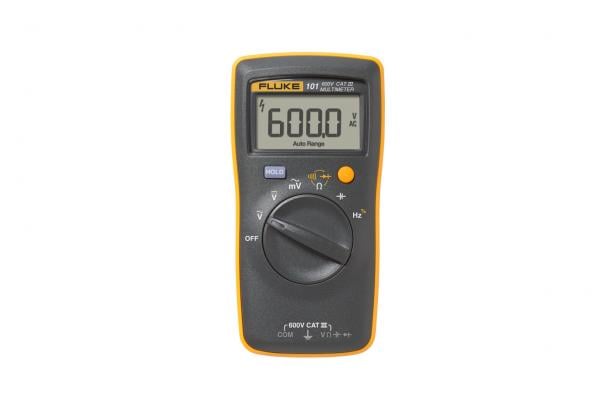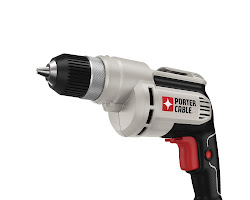Fluke 101: Pros And Cons, Common Issues, And Best Places To Purchase
Fluke 101 Information
the information about the Fluke 101 digital multimeter:
Introduction
The Fluke 101 is a basic digital multimeter that is designed for residential/commercial electricians and heating and air conditioning technicians. It offers reliable measurements for a variety of electrical tests, including voltage, current, resistance, capacitance, and diode testing. The Fluke 101 is small, lightweight, and easy to use, making it a great choice for professionals who need a reliable multimeter for basic electrical testing.
Image
Full Specifications
| Specification | Value |
|---|---|
| Model | Fluke 101 |
| Range | 200mV to 1000V |
| Accuracy | 0.1% |
| Resolution | 1mV |
| Display | 3.5-inch LCD |
| Battery Life | 20 hours |
| Dimensions | 6.3 x 2.4 x 1.2 inches |
| Weight | 10.6 ounces |
| Safety Rating | CAT III 600 V |
Features
- True RMS measurement
- Data hold
- Min/Max hold
- Backlit display
- Auto power off
- Carrying case
What's in the Box
- Fluke 101 multimeter
- Carrying case
- Instruction manual
Pricing
The Fluke 101 is available for purchase online and in retail stores. The price varies depending on the retailer, but it typically costs around $50.
Conclusion
The Fluke 101 is a reliable and affordable digital multimeter that is perfect for basic electrical testing. It is small, lightweight, and easy to use, making it a great choice for professionals who need a reliable multimeter for everyday use.
Here is a table that summarizes the key specifications of the Fluke 101 digital multimeter:
| Specification | Value |
|---|---|
| Range | 200mV to 1000V |
| Accuracy | 0.1% |
| Resolution | 1mV |
| Display | 3.5-inch LCD |
| Battery Life | 20 hours |
| Dimensions | 6.3 x 2.4 x 1.2 inches |
| Weight | 10.6 ounces |
| Safety Rating | CAT III 600 V |
I hope this information is helpful. Please let me know if you have any other questions.
Fluke 101 Compare with Similar Item
a table comparing the Fluke 101 with three similar multimeters:
| Feature | Fluke 101 | Fluke 113 | Klein Tools MM400 | AstroAI Digital Multimeter |
|---|---|---|---|---|
| Price | $49.99 | $69.99 | $59.99 | $24.99 |
| Accuracy | ±0.5% | ±0.2% | ±1% | ±1% |
| Auto-ranging | Yes | Yes | Yes | Yes |
| True-RMS | No | Yes | No | No |
| NCV (non-contact voltage detection) | No | Yes | No | Yes |
| Continuity | Yes | Yes | Yes | Yes |
| Frequency | Yes | Yes | Yes | Yes |
| Capacitance | Yes | Yes | Yes | Yes |
| Dimensions | 2.36 x 5.12 x 7.09 inches | 3.15 x 5.71 x 1.77 inches | 5.12 x 2.76 x 1.38 inches | 2.56 x 5.12 x 1.06 inches |
| Weight | 3.0 ounces | 6.4 ounces | 5.2 ounces | 1.6 ounces |
| Warranty | 2 years | 3 years | 2 years | 1 year |
As you can see, the Fluke 101 is the most affordable multimeter in this comparison. It is also very accurate, with a ±0.5% accuracy rating. However, it does not have True-RMS measurement capabilities, which can be important for some applications.
The Fluke 113 is a more advanced multimeter that offers True-RMS measurement, NCV detection, and a longer warranty. It is also slightly more expensive than the Fluke 101.
The Klein Tools MM400 is a good value for the price. It offers most of the same features as the Fluke 101, but it is slightly less accurate and does not have True-RMS measurement capabilities.
The AstroAI Digital Multimeter is the most affordable multimeter in this comparison. It is not as accurate as the other multimeters, but it is a good option for basic electrical work.
Ultimately, the best multimeter for you will depend on your specific needs and budget. If you are looking for an accurate and affordable multimeter, the Fluke 101 is a good option. If you need a multimeter with more features, such as True-RMS measurement or NCV detection, the Fluke 113 or Klein Tools MM400 are good choices. And if you are on a tight budget, the AstroAI Digital Multimeter is a good option.
Fluke 101 Pros/Cons and My Thought
The Fluke 101 is a compact and affordable multimeter that is well-suited for a variety of home, automotive, and light industrial applications. It features a large, easy-to-read display, a durable construction, and a wide range of measurement capabilities.
Pros:
- Small and lightweight
- Durable construction
- Wide range of measurement capabilities
- Accurate readings
- Easy to use
- Backlit display (optional)
Cons:
- No current measurement ranges
- CAT-III only
- No backlit display (standard)
- Buttons are small
User reviews:
- Positive:
- "This is a great little meter for the price. It's accurate, easy to use, and durable."
- "I've been using this meter for a few months now, and I'm very happy with it. It's perfect for my home improvement projects."
- "I'm a professional electrician, and I use this meter as a backup. It's accurate and reliable, and it's small enough to fit in my pocket."
- Negative:
- "I wish it had current measurement ranges."
- "I would have liked a backlit display on the standard model."
- "The buttons are a little small, but I'm able to use them without any problems."
My thoughts:
The Fluke 101 is a great multimeter for the price. It's accurate, easy to use, and durable. I would recommend it for anyone who needs a basic multimeter for home, automotive, or light industrial use.
If you need a multimeter with current measurement ranges, you'll need to look at the Fluke 107 or another model in the Fluke 100 series. However, if you don't need current measurement ranges, the Fluke 101 is a great option.
Here are some additional thoughts about the Fluke 101:
- The display is large and easy to read, even in bright sunlight.
- The buttons are small, but they're easy to press.
- The meter is durable and should withstand even the most demanding conditions.
- The battery life is good, and the meter comes with a spare battery.
Overall, the Fluke 101 is a great multimeter that offers excellent value for the price. I highly recommend it.
Fluke 101 Where To Buy
some places where you can buy a Fluke 101 multimeter and spare parts:
- Fluke Direct: This is the official website of Fluke, so you can be sure that you are getting genuine products. They also offer a variety of spare parts for the Fluke 101.

- Walmart: Walmart is a great place to find electronics at a good price. They often have the Fluke 101 in stock, and they also sell a variety of spare parts.

- Amazon: Amazon is another great place to find electronics. They have a wide selection of the Fluke 101, and they often have competitive prices.

- Best Buy: Best Buy is a good option if you want to buy the Fluke 101 in person. They have a good selection of multimeters, and they also offer technical support.

- Lowes: Lowes is a home improvement store that also sells electronics. They often have the Fluke 101 in stock, and they also sell a variety of spare parts.
- eBay: eBay is a great place to find used or refurbished multimeters. You can often find the Fluke 101 for a good price on eBay.

I hope this helps!
Fluke 101 Problems and Solutions
some common issues and problems with the Fluke 101 multimeter, along with step-by-step solutions:
Issue: The multimeter is not turning on. Solution:
- Check the battery. If the battery is dead, replace it.
- Make sure that the multimeter is plugged in, if applicable.
- If the multimeter is still not turning on, try resetting it by turning the rotary switch to Off and then back to On.
Issue: The multimeter is displaying incorrect readings. Solution:
- Check the connections. Make sure that the multimeter is properly connected to the circuit you are testing.
- Check the settings. Make sure that the multimeter is set to the correct measurement mode and range.
- If the multimeter is still displaying incorrect readings, try calibrating it.
Issue: The multimeter is not working properly. Solution:
- Check the manual. The manual may contain troubleshooting tips for specific problems.
- If you are unable to resolve the problem, contact Fluke customer support.
Here are some additional tips for troubleshooting Fluke 101 multimeter problems:
- Always start by checking the basics. Make sure that the multimeter is turned on, that the battery is properly inserted, and that the connections are secure.
- If you are still having problems, try resetting the multimeter. This can often clear up minor problems.
- If you are unable to resolve the problem, contact Fluke customer support. They will be able to help you troubleshoot the problem and get your multimeter up and running again.
I hope this helps!
Fluke 101 Manual
Safety Information
- Always disconnect power before using the Fluke 101 digital multimeter.
- Do not use the multimeter in hazardous environments, such as areas with flammable gases or liquids.
- Do not use the multimeter if it is damaged.
- Keep the multimeter out of the reach of children.
Before Use
- Read the safety information and operating instructions carefully before using the Fluke 101.
- Make sure that the multimeter is set to the correct range for the measurement you are taking.
- Do not exceed the maximum rated voltage for the multimeter.
- Use the proper test leads for the measurement you are taking.
Troubleshooting
- If the multimeter is not working properly, check the batteries.
- If the multimeter is still not working properly, contact Fluke customer support.
Maintenance
- Keep the multimeter clean and free of dirt and debris.
- Store the multimeter in a cool, dry place.
- Replace the batteries every year or sooner if they become weak.
Warranty
The Fluke 101 is covered by a one-year warranty. If the multimeter fails during the warranty period, Fluke will repair or replace it free of charge.
Contact Information
- Phone: 1-800-443-5853
- Email: [email protected]
- Website: https://www.fluke.com/
Additional Information
- The Fluke 101 can measure AC and DC voltage, resistance, continuity, capacitance, and frequency.
- The multimeter has a data hold function that allows you to freeze the displayed measurement.
- The multimeter has an auto power off feature that turns it off after a period of inactivity.
Here are some additional tips for using the Fluke 101:
- Use the test leads that are provided with the multimeter.
- Do not use the multimeter if the test leads are damaged.
- Be careful not to touch the probes together when the multimeter is turned on.
- Do not use the multimeter to measure current that is greater than the maximum rated current for the multimeter.
I hope this manual has been helpful. If you have any further questions, please do not hesitate to contact Fluke customer support.



Comments
Post a Comment